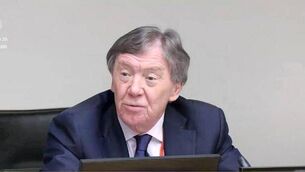Waterford Doctor under siege in Palestine hospital
Cavan-native Dr Morgan McMonagle who is currently based out of Nasser Hospital in Gaza. Photo: RTÉ Upfront
A University Hospital Waterford surgeon is performing humanitarian medical work in a Palestinian hospital which was reportedly attacked numerous times by airstrikes from the Israel Defense Forces (IDF).
Dr Morgan McMonagle, a consultant Vascular and Trauma Surgeon at University Hospital Waterford, has been performing life-saving surgery for sick and injured people in field hospitals in and near Khan Younis, Palestine. The surgeon, no stranger to warzones, having taught medics in war-torn areas of Ukraine, has spent some time performing surgery at the city's main medical facility, Nasser Hospital.
Over the past weekend, the hospital was attacked following the resumption of attacks by the Israeli military including one airstrike which was captured on live television by the Doha-based broadcaster Al-Jazeera.
Following the airstrikes, concern has been raised by locals in Waterford over the safety of the Irishman. Waterford-based activist group, Gaeil ar son Gaza said on Sunday, March 23: "With the news tonight that Nasser Hospital itself has been bombed, there is real fear for Dr McMonagle's life."
The group has called on Waterford's elected TDs to make the case to Simon Harris, the Minister for Foreign Affairs to "speak up and clearly to save Dr McMonagle's life and publicly call on Israel to end the war crime of bombing hospitals".
Gaeil ar son Gaza labelled the government's actions on the issue as "watching from the sidelines as the carnage unfolds".
Dr McMonagle is legitimately acting as a humanitarian aid worker in Khan Younis, having flown from Ireland to Egypt and received permission to enter Gaza after a "huge amount of red tape involved at a security level".
Over the weekend, the UHW surgeon spoke to RTÉ's 'Today with Claire Byrne', following the resumption of Israeli attacks in his area.
He explained he has been in Gaza for five week: "I have been here five weeks now and no-one expected the ceasefire to fall apart this soon. It came as a shock."
“We spent the first 20 minutes pronouncing people dead, mostly children," the surgeon said, "the majority were children, followed by sick and injured children [and] very quick decisions had to be made."
The surgeon told the story of a young child who was injured in the attacks: "I picked up a four-year-old boy, who was seriously injured and took him up four or five flights of stairs to the operating room. He’s currently doing okay but our facilities have been torn apart because of the conflict."
Dr McMonagle said the youngest child he has pronounced dead "was four or five months old" and added: "The average age is probably between six and eight years of age. The latest figures we saw is that this week, 40% of those killed are under the age of 14."
"We operated from about 2.45 in the morning and I finished my last case at 10 o'clock," the Cavan native said, explaining he had "carried out between 16 and 20 operations but it is very difficult to keep count because you are literally running from one operating room to the next.”
The surgeon said about 70 people were brought straight to the Nasser Hospital mortuary and that "shrapnel is the biggest enemy" in the attacks.
"You get thousands and thousands of pieces of shrapnel", created by airstrikes which appear to cause minor surface-level injuries but cause "very major injuries on the inside".
Waterford News & Star has contacted Dr McMonagle for interview and has reached out to UHW to enquire as to the surgeon's safety.






